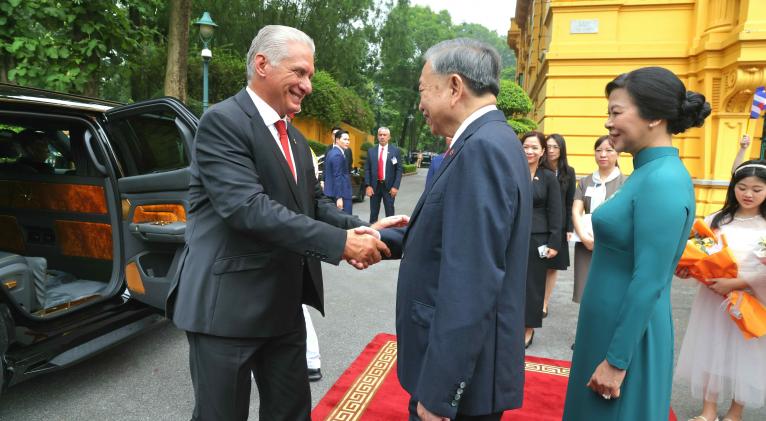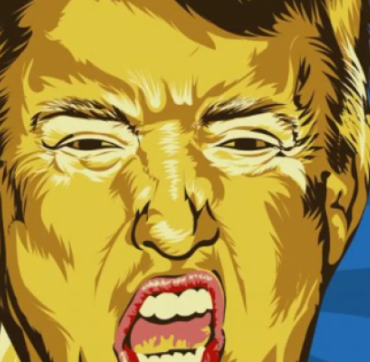Cuba and Vietnam Strengthen Ties with New Agreements During Díaz-Canel's Visit
especiales

HANOI.- The First Secretary of the Central Committee of the Communist Party and President of the Republic, Miguel Díaz-Canel Bermúdez, began his Monday in this brother country with a solemn and emotional tribute at the Mausoleum of President Ho Chi Minh, where he laid a floral wreath on behalf of the Cuban people.
The Head of State has been engaged in an intense work agenda in Vietnam since Sunday, where he is conducting an official visit and will participate in the commemorations for the 80th Anniversary of Vietnam's Independence on September 2, and the 65th anniversary of the establishment of bilateral relations.
Following the tribute, the General Secretary of the Communist Party of Vietnam (CPV), Comrade To Lam, led the state reception for Díaz-Canel at the Gardens of the Presidential Palace. From there, both leaders proceeded to the CPV Central Committee headquarters to chair official talks between the two delegations.
The Vietnamese leader expressed his delight at the visit of the First Secretary of the PCC and recalled the deep bonds of friendship and solidarity that unite both parties, governments, and peoples, forged by Commander-in-Chief Fidel Castro Ruz and President Ho Chi Minh, and by Army General Raúl Castro Ruz.
To Lam highlighted the strength of relations that have been maintained and developed consistently, even during the most difficult times for both nations, when mutual support and assistance, solidarity, and friendship were provided, now renewed in the realm of economic cooperation.
President Díaz-Canel conveyed greetings to To Lam from Army General Raúl Castro Ruz, who sent congratulations for the 80th Anniversary of the August Revolution. He also reviewed the "historic bonds of brotherhood and solidarity" between the peoples of Cuba and Vietnam, whose resilience serves as an example to the world.
These are time-tested relations, he emphasized, based on the ties created between Fidel and Ho Chi Minh, Army General Raúl Castro Ruz, and the current leadership of our country.
Díaz-Canel thanked To Lam for the invitation to participate in the 80th Anniversary of the August Revolution and the Declaration of Independence on September 2, 1945, when Ho Chi Minh proclaimed victory and the end of French colonialism.
"For us, it is an honor and a duty to accompany Vietnam in celebrating such extraordinary events, which made it the first worker and peasant state in Southeast Asia," he said.
The Cuban President praised the enthusiasm, militancy, and patriotic love of the Vietnamese people. He noted that the streets of Hanoi are overflowing with people imbued with these tremendous celebrations.
He also mentioned that wherever he and the Cuban delegation go, they have been receiving tremendous affection and warmth towards the Cuban Revolution, as happened on Sunday at the Military History Museum.
Díaz-Canel highlighted the renewal and impetus given to bilateral relations and cooperation since To Lam's visit to Cuba a year ago and reaffirmed the importance of both communist parties strengthening their ties in all areas.
He thanked the CPV for the systematic high-level visits to Cuba and for the solidarity campaign that has raised significant funds as donations for the Cuban people in just a few days, demonstrating the profound nature of our relations.
He emphasized that both countries will mark important political celebrations next year, such as the congresses of their respective parties, and recommended that exchanges on the outcomes of these events be held afterward.
In 2026, he added, the 60th anniversary of the first visit of Army General Raúl Castro Ruz to Vietnam will be commemorated. In 1966, he met Ho Chi Minh personally and shared with a people fighting against American occupation. This was one of the most significant events in the relations between our countries, he stated.
The leaders underscored their commitment to continue consolidating and strengthening friendship and solidarity, supreme goals witnessed by both peoples day after day, now with Díaz-Canel's presence in Hanoi.
The Cuban delegation in the talks between the highest party authorities included Political Bureau members Bruno Rodríguez Parrilla, Minister of Foreign Affairs, and Army Corps General Álvaro López Miera, Minister of the Revolutionary Armed Forces.
Also participating were Emilio Lozada García, head of the Central Committee's Foreign Relations Department; and ministers Oscar Pérez-Oliva Fraga of Foreign Trade, and Ydael Pérez Brito, among other Caribbean leaders.
At the end of the dialogue, To Lam and Díaz-Canel presided over an exchange of agreements and memoranda signed in the areas of rice production, comprehensive cooperation, health, document and archives management, and a new joint venture.
During the ceremony, a symbolic presentation was made of the first part of the campaign in support of the Island, "65th Anniversary of Vietnam-Cuba Friendship," which has already raised approximately 385 billion dong, equivalent to 14.5 million dollars.
DETAILS OF THE NEW AGREEMENTS
The official delegations of Cuba and Vietnam exchanged folders containing the documents signed in the context of the visit of the First Secretary of the Party and President of the Republic, Miguel Díaz-Canel Bermúdez, at the end of the official talks at the CPV Central Committee.
The negotiations included a Cooperation Agreement between the Government of the Republic of Cuba and the Government of the Socialist Republic of Vietnam to promote rice production in the period 2025-2027.
The folders were exchanged by Ydael Pérez Brito, Minister of Agriculture, for Cuba, and Tran Duc Thang, interim Minister of Agriculture and Environment, for Vietnam. The agreement promotes cereal production to ensure food security.
The initiative will be developed in two phases and will conclude in 2027. It aims to cover between 15,000 to 20,000 hectares of land for rice production in the provinces of Pinar del Río, Sancti Spíritus, and Granma.
The Protocol of the XLII Session of the Intergovernmental Commission for Economic and Scientific-Technical Collaboration was also documented, outlining the results of cooperation in various sectors and the actions to be taken in the coming year. It was received by Oscar Pérez-Oliva Fraga, Minister of Foreign Trade and Foreign Investment, and Nguyen Tuong Van, Deputy Minister of Construction.
A Memorandum of Understanding on health cooperation between the Cuban Ministry of Public Health and the People's Committee of Ho Chi Minh City was also established. It sets out cooperation to implement the family doctor model, collaborate in the pharmaceutical field, and implement comprehensive health programs in needed areas, among other things.
The document was exchanged by Rogelio Polanco Fuentes, Cuban Ambassador to Vietnam, and Nguyen Thi Dieu Thuy, Vice President of the People's Committee of Ho Chi Minh City.
A Memorandum of Understanding on cooperation in document management and archives between the Ministry of Science, Technology, and Environment (Citma) and the State Department of Records and Archives of the Ministry of Internal Affairs of Vietnam was also shared.
The purpose is to promote and foster mutually advantageous cooperation in the field of document management and archives. The folder was exchanged between Ambassador Polanco Fuentes and Dang Thanh Tung, Director General of the State Administration of Records and Archives of the Ministry of Internal Affairs.
Finally, the Cuban Ambassador and the Director of the Green Economy Institute, Duong Thi Bich Diep, received a Memorandum of Understanding for the establishment of a joint venture between this institution and the Cuban company Labiofam.
Both entities agreed to work towards an agreement on a joint venture, which will be organized in accordance with the regulations of both countries and aims to receive, develop, and commercialize Labiofam's technologies in Vietnam.
They intend to conduct research, production, and business activities in the fields of pharmaceuticals, agricultural biotechnology, public health, and natural cosmetics; participate in R&D activities, technology transfer, and expansion into Asian and African markets; and invest and co-invest in biomedical projects using Cuban technologies, experts, and doctors, to improve public health.
MEETING WITH PRESIDENT LUONG CUONG
After the dialogue with To Lam at the Party Central Committee headquarters, Díaz-Canel and the Cuban delegation moved to the nearby Presidential Palace, where they were received by the President of the Socialist Republic of Vietnam, Luong Cuong, with whom he held official talks.
The host leader conveyed to his Caribbean counterpart, "on behalf of the Party, the State, and the Vietnamese people, the warmest welcome for his state visit and his participation in the celebrations for the 80th Anniversary of the Victory."
"This is also," he added, "a special occasion because we are celebrating the 65th anniversary of the establishment of our diplomatic relations. The people of Vietnam," he said, "are proud of the accompaniment, support, and valuable assistance given by the Cuban people since the national liberation struggle."
"In the most difficult moments, you were by our side, and we will never forget it. We always remember Commander-in-Chief Fidel Castro, who expressed that the Cubans 'for Vietnam, are willing to give even our own blood.'"
In his words of thanks, Díaz-Canel expressed to Comrade Luong Cuong his satisfaction at being able to share with him after he assumed the responsibility of President of the Socialist Republic of Vietnam. "We do so," he emphasized, "knowing that we are in the presence of a sincere friend of Cuba."
The leader congratulated his counterpart on the excellent organization of the celebrations for the 80th Anniversary of Independence and for the joy, jubilation, and satisfaction felt among the Vietnamese people, especially the youth.














Add new comment